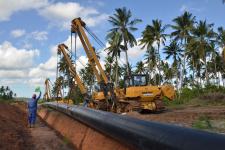Local populations are often marginalized in oil and gas projects in Africa

Local populations are rarely allowed to influence the negotiation of oil and gas contracts in sub-Saharan Africa directly. Perhaps therefore, scholarly attention to their active role in the development of the continent’s petroleum sectors has been limited. Most attention has been paid to the making of social and environmental investment standards that could improve communities’ plight when investment projects take off. A new book chapter by senior lecturer Opportuna Kweka University of Dar es Salaam - College of Social Sciences | Staff List (udsm.ac.tz) from University of Dar es Salaam and DIIS researcher Rasmus Hundsbæk Pedersen however points to a repertoire of actions local populations have deployed to influence the implementation of gas and gas-related projects.
The chapter, which is based on empirical research in mainland Tanzania, identifies more politicised processes than is often depicted in the existing literature. This has to do with the fact that Tanzania’s land and mineral resources are publicly owned, which means that the government is strongly involved in the implementation of projects. Therefore, in order to influence deals and increase the benefits from projects local populations tend to target decisionmakers more than the international oil companies making the investments: through riots and resistance related to the control over resources; through legalism from below, which targets the particular terms under which land is acquired; and through voting behavior that aims to reward or punish the ruling politicians who are in a position to influence the institutional framework that structures investments. Whereas their effects should not be overestimated these actions suggest that local populations may exercise greater agency than often depicted.
DIIS Experts

